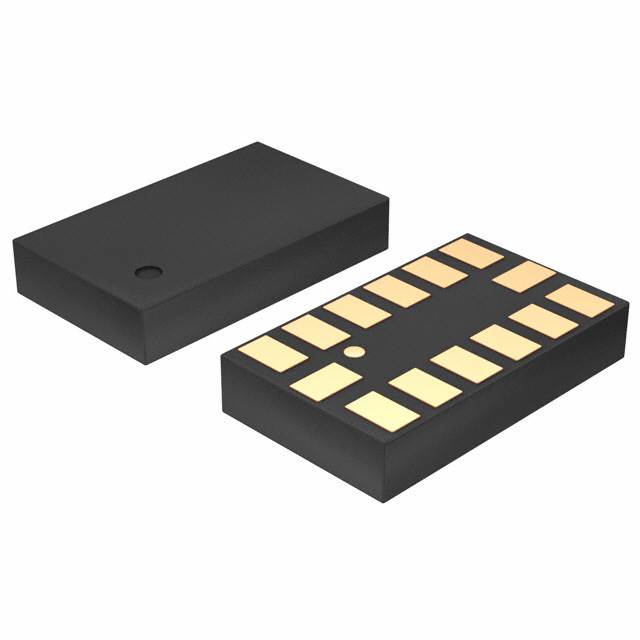ADXL375BCCZ
Product Overview
The ADXL375BCCZ belongs to the category of accelerometers and is designed for use in various applications that require accurate measurement of acceleration. This sensor is known for its high precision, small package size, and low power consumption. The ADXL375BCCZ is typically available in a surface-mount package and is essential for capturing precise motion and tilt data.
Basic Information
- Category: Accelerometer
- Use: Measurement of acceleration in various applications
- Characteristics: High precision, small package size, low power consumption
- Package: Surface-mount
- Essence: Capturing precise motion and tilt data
- Packaging/Quantity: Typically sold in reels or trays
Specifications
- Measurement Range: ±200g
- Output Type: Digital (SPI and I2C)
- Operating Voltage: 1.8V to 3.6V
- Low Power Consumption: 150 μA at 1.8V
- High Resolution: Up to 13-bit resolution
Detailed Pin Configuration
The ADXL375BCCZ features a standard pin configuration with pins for power supply, communication interface, and output signals. The detailed pinout is as follows:
| Pin Name | Function | |----------|----------------| | VDD | Power Supply | | GND | Ground | | CS | Chip Select | | SDO | Serial Data Out| | SDI | Serial Data In | | SCL | Serial Clock |
Functional Features
- High precision measurement of acceleration
- Digital output for easy interfacing with microcontrollers
- Low power consumption for extended battery life
- Wide operating voltage range for flexibility in different applications
Advantages and Disadvantages
Advantages
- High precision measurement
- Low power consumption
- Small package size
- Digital output for easy integration
Disadvantages
- Limited measurement range compared to some other models
- Requires careful handling due to its small size
Working Principles
The ADXL375BCCZ operates based on the principle of capacitive sensing. It utilizes a microelectromechanical system (MEMS) structure to detect changes in capacitance caused by acceleration. These changes are then converted into digital signals for further processing.
Detailed Application Field Plans
The ADXL375BCCZ finds extensive use in various fields such as: - Industrial machinery monitoring - Structural health monitoring - Wearable devices for activity tracking - Robotics and drones for motion control - Automotive safety systems for impact detection
Detailed and Complete Alternative Models
Some alternative models to the ADXL375BCCZ include: - ADXL345: Offers similar functionality with a wider measurement range - LIS3DH: Provides comparable performance with different packaging options - MPU-6050: Combines accelerometer and gyroscope functions for more comprehensive motion sensing
In conclusion, the ADXL375BCCZ is a highly precise accelerometer suitable for a wide range of applications, offering compact size, low power consumption, and digital output for seamless integration into various systems.
Word Count: 497
قم بإدراج 10 أسئلة وإجابات شائعة تتعلق بتطبيق ADXL375BCCZ في الحلول التقنية
What is the operating voltage range of ADXL375BCCZ?
- The operating voltage range of ADXL375BCCZ is 2.0V to 3.6V.
What is the typical output data rate of ADXL375BCCZ?
- The typical output data rate of ADXL375BCCZ is 3200 Hz.
How can I interface ADXL375BCCZ with a microcontroller?
- ADXL375BCCZ can be interfaced with a microcontroller using SPI or I2C communication protocols.
What is the measurement range of ADXL375BCCZ?
- The measurement range of ADXL375BCCZ is ±200g.
Can ADXL375BCCZ be used for vibration monitoring applications?
- Yes, ADXL375BCCZ is suitable for vibration monitoring applications due to its high measurement range and sensitivity.
Does ADXL375BCCZ have built-in self-test capability?
- Yes, ADXL375BCCZ features built-in self-test capability for verifying sensor functionality.
What is the power consumption of ADXL375BCCZ?
- The power consumption of ADXL375BCCZ is typically 150 μA at a 3200 Hz output data rate.
Is ADXL375BCCZ suitable for automotive applications?
- Yes, ADXL375BCCZ is suitable for automotive applications such as airbag deployment systems and vehicle stability control.
Can ADXL375BCCZ be used in wearable devices?
- Yes, ADXL375BCCZ is suitable for use in wearable devices due to its low power consumption and small form factor.
What are the key differences between ADXL375BCCZ and other accelerometers in the same series?
- The key differences include the measurement range, output data rate, and power consumption, which may vary among different models in the series.


